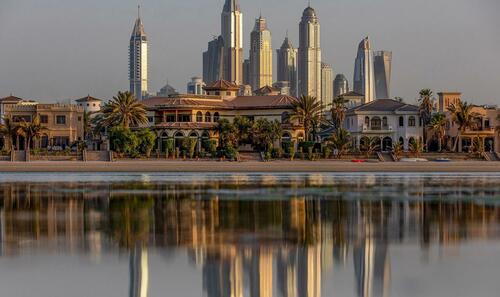Dubai’s Economy Booms As Wealthy Russians Seek Refuge In Local Property Market
A couple of weeks ago, we highlighted a report claiming that crypto firms in the UAE (which is fast becoming a hotbed for the regional crypto industry) had seen a massive influx of demand from brokers trying to liquidate billions of dollars’ worth of crypto on behalf of wealthy Russian clients, in the hopes that the money could then be stashed in the UAE, which has pledged to remain neutral as the conflict in Ukraine rages.
While at least one US megabank expressed skepticism that oligarchs were using crypto as a means to evade sanctions, it was quickly revealed that most of these transactions involved foreign currencies instead of rubles, effectively masking the source of the buying.
Now, as the US threatens to seize US properties belonging to oligarch Roman Abramovich (who recently moved two of his megayachts to Turkey, and is in the process of divesting his ownership of Chelsea Football Club), Bloomberg reports that Abramovich (and his fellow oligarchs) are increasingly turning to the UAE, where they’re looking to park money in property and other assets.
While western watchdogs like the Financial Action Task Force have expressed their displeasure with the UAE’s “Open Door Policy” by placing the country on a “grey list” of jurisdictions that don’t do enough to combat financial crime, the locals are simply seeing dollar signs.
“In Dubai there’s an old saying that goes: when the region does well, we do well, but when there’s a crisis, we do really well,” said Chirag Shah, the founder of the consultancy 1 International FinCentre Associates, who was previously the chief strategy and business development officer at Dubai’s financial free zone, speaking broadly about the city’s ability to navigate global upheaval from wars to politics to the coronavirus pandemic.
But the real threat perceived by the west has nothing to do with white-collar crime. As Bloomberg pointed out in its report, “the money flowing in from Moscow has left some US Treasury officials concerned that CIPS – the Chinese cross-border yuan payment system seen as a potential rival to the global SWIFT transaction messaging system – may be turning into a key vehicle for Russians to route their money to the UAE using the offshore Chinese yuan to circumvent US sanctions.”
For more on these risks, we would direct you, dear reader, to these comments from a senior IMF official, who recently parroted one of Russian President Vladimir Putin’s favorite criticisms of Washington’s financial sanctions.
While they were specifically discussing the risks that sanctions could push the central banks to diversify their foreign-currency reserves away from the dollar (for fear that these reserves could someday be forcefully expropriated by a vengeful west), the same argument holds.
What’s more, it’s not just the oligarchs who see opportunity in Dubai. Pretty soon, even less-wealthy, and even middle-class Russians, might follow in their footsteps, moving their assets to Dubai, and perhaps snapping up property or other assets, safe in the notion that they will be out of the reach of the West. This could be true even for Russians with few, or no, links to the state, or sanctioned individuals.
Even Russians with transparent sources of income and without links to state authorities are afraid that they will be lumped together with sanctioned businessmen or that their assets could be taken away, said Daria Nevskaya, a partner at the Moscow-based lawfirm FTL Advisers, which serves wealthy Russians. Some rich Russians are trying to restructure ownership of their assets “so that they are not subject to a witch hunt,” she said.
Nevskaya recently arrived in Dubai herself because the firm has seen a surge in demand from Russians to register companies in the UAE to hold their assets, including financial ones, she said.
Even before the war in Ukraine, demand for property from Russian buyers was surging. Car dealerships in the country are moving to hire more Russian speakers. It has all the hallmarks of a financial boom. Local stores stock Russian-style sour cream and cottage cheese, along with Russian ice cream brands and other delicacies popular with Russians.
The increasing appeal to rich Russians is also evident. Demand from Russians for Dubai property is up 40% so far in March compared with February, the Russian newspaper Kommersant reported, citing real estate firm Golden Brown Group.
Nevskaya, the lawyer, said a popular way for Russians to obtain a residence visa in the emirate is via the purchase of real estate worth 5 million dirhams ($1.5 million), while a cheaper option is to obtain a residence visa by opening a company.
“If we talk in absolute numbers about UAE residency, the demand has increased by 100%” from Russians, said Polina Kuleshova from residency and citizenship advisory firm Henley & Partners.
…
But for now the Russian influx is underpinning a high-end boom in Dubai. Hotel lobbies echo to the sound of Russian and one car dealer – who asked not to be identified discussing the matter – is going so far to hire more Russian speakers after seeing a big uptick in demand for luxury vehicles from Moscow migrants.
Seeing this, nearby Qatar is also trying to get in on the action. And Israel, which has been reluctant to jeopardize its relationship with Moscow, also remains relatively hospitable (although perhaps not for individuals on the sanctions list).
As European leaders struggle to find ways to eliminate “loopholes” in the sanctions regime, the situation in Dubai is just the latest example of how trying to cut Russians off from the international financial system is a bit like squeezing a balloon – when pressure is applied to one area, the air inside simply moves elsewhere.
Tyler Durden
Sat, 03/26/2022 – 18:00

